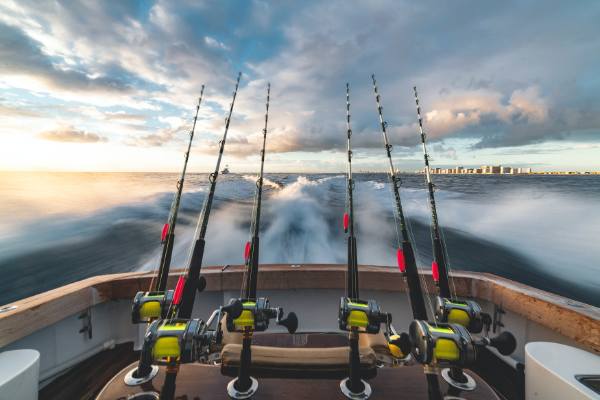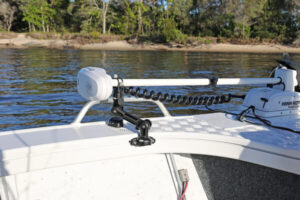Being seasick while fishing is not only uncomfortable but can also negatively impact your ability to catch fish and your overall fishing experience. While everyone who becomes seasick will eventually feel better while at sea, it typically takes their bodies 12 to 24 hours to adjust to the motion of the ship. Learn how to avoid seasickness in this manual to make the most of your time on the water.
What Is Sea Sickness
Up to 60% of people experience motion sickness at some point in their lives, which includes seasickness. When the inner ear and eyes don’t communicate with the brain properly, it can cause seasickness.
When your inner ear detects motion and your balance is off, it sends a message to your brain’s vomiting center instructing you to vomit and causing you to feel sick on rough waters.
A boat’s motion can cause seasickness, which can result in nausea, headaches, dizziness, and cold sweats. Seasickness symptoms can be mild to severe, and in some cases, they can be so incapacitating that people are unable to perform basic tasks.
What Can Trigger Seasickness
Anyone can experience motion sickness while out fishing. Despite this, there are a variety of situations and health issues that can make people more susceptible to experiencing nausea, vomiting, and seasickness.
- Aging: Motion sickness, such as seasickness, is much more common in older people. The likelihood of experiencing motion sickness on a boat rises as we age because we lose our sense of balance.
- Alcohol. Consuming alcohol prevents your body from adjusting to motion, which causes you to feel seasick.
- Dehydration: You run the risk of becoming dehydrated if you don’t drink enough water, which could aggravate your seasickness.
- Fatigue. Feeling tired before or during a boat trip increases your risk of becoming seasick. Before going deep sea fishing, make sure you get a good night’s sleep.
- The risk of carbon monoxide poisoning for boaters is another. Carbon monoxide can accumulate when engines are operating in places that aren’t well-ventilated. Headache, wooziness, and nausea are possible symptoms.
- A ship’s seasickness may be exacerbated by certain foods consumed prior to boarding. Certain foods are more likely to make your stomach feel uncomfortable.
- being in small places Staying below deck or in a cramped space could make you seasick.
- the time it takes to travel somewhere. Trips that are longer than usual tend to make people feel seasick more.
- Additionally causing and aggravating seasickness, and windy or stormy weather. Yes, the swell does affect the motion of the boat, which in turn affects your body.
- Another factor that can worsen seasickness is direct sunlight reflecting off the water.
- Some people may become seasick from the smell of salt water and diesel fuel.
- birth and pregnancy. Women who are pregnant or recently delivered have a higher risk of experiencing motion sickness and seasickness.
- a propensity for motion sickness from other sources, such as driving or riding in roller coasters or amusement parks.

How To Not Get Seasick On A Fishing Boat
Seasick Medicine
You may be more prone to getting seasick than others if you have previously experienced motion sickness in a boat, car, amusement park ride, or airplane.
You should consider taking seasickness medication both the night before and the morning of your trip, regardless of whether you believe you are prone to becoming seasick.
Additionally, some of our clients have found great success with the patches that you can wear the entire fishing trip.
Alcohol Intake
The night before and throughout your trip, you should refrain from consuming too much alcohol. Compared to waking up dehydrated and fishing while suffering from a splitting headache, fishing is much more enjoyable when one is well-rested.
A late night out at the bars can result in seasickness in addition to a hangover. Overindulging the night before can also cause you to sleep too much and completely miss your trip.
Stay Hydrated
The hot sun and salty air can cause dehydration, so it’s crucial to drink water while fishing. In order to counteract the dehydrating effects of alcohol, remember to also drink water if you decide to consume alcohol while fishing.
Although most fishing conditions are familiar to our crew members, many of our customers do not have the opportunity to fish in the ocean frequently.
Fresh Air
You should spend as much time outside and in the open air as you can while fishing. Having your nose in the fresh air is a great way to prevent seasickness because some strong odors can cause it. Several slow, deep breaths of fresh air can be very beneficial if you start to feel queasy.
Too much time spent in the cabin can make you seasick. It is best to avoid situations where the boat rocks or moves up and down while you are in a seemingly stationary room because it creates a dissonance between your visual and emotional perceptions.
Instead, remain outside in the open air and keep an eye on the horizon, which will shift in time with the boat.
Keep Your Eyes Outside The boat
Reading or staring at your phone while on a fishing boat can make you seasick, just like looking around the cabin while the boat is moving. Ask your Captain or Mate for clarification or find out how you can continue to participate in the fishing.
One of the best ways to prevent getting seasick is to keep your mind occupied and away from the thought of getting seasick.
Wrist Bands
There are wristbands that prevent motion sickness that uses magnetic fields or acupressure. Some people vouch for these wristbands, while others claim they are ineffective. One thing we do know is that your mindset can frequently cause or prevent seasickness.
Get Enough Sleep
Before you board the boat, you can do a lot to avoid getting seasick. Arriving rested will help you maintain your stamina and lower your risk of motion sickness caused by fatigue. This will ensure that your body is in top condition.
Furthermore, lack of sleep can hinder your vestibular system’s process of habituation, according to research from the United States Navy., it can lower your inner ear’s ability to adapt to changes in your body’s equilibrium.
The effects of seasickness may become more severe and frequent as a result. Therefore, before setting out on your journey, make sure you’re well-rested.
Munch On Ginger
Bring some ginger if you’d like an all-natural alternative to help you combat motion sickness. Long used by sailors, a Brigham Young University study discovered that one gram of ginger is actually more effective at treating motion sickness than the usual dosage of Dramamine.
Scientists believe that ginger reduces the effects of motion sickness by blocking messages between your digestive system and your brain, though we don’t fully understand how this works just yet.
You can try a ton of ginger-related products, including gums, capsules, lollipops, and tea. Find a form you like, and keep it handy for your fishing trip.



